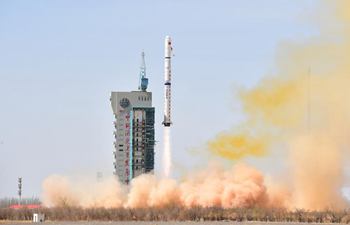
Aerial photo taken on April 10, 2018 shows buses of Anhui Ankai Automobile Company to be exported to Saudi Arabia in Hefei, capital of east China's Anhui Province. The buses of Ankai have been exported to more than 80 countries and regions. (Xinhua/Zhang Duan)
BEIJING, April 13 (Xinhua) -- China Friday reported sound growth in foreign trade for the first quarter and an over one-fifth drop in the trade surplus, pointing to a more balanced trade picture.
The country's goods exports rose 7.4 percent year on year in the first three months while imports grew 11.7 percent, resulting in a trade surplus of 326.18 billion yuan (about 51.85 billion U.S. dollars), according to the General Administration of Customs (GAC).
The surplus was 21.8 percent lower compared with the first quarter last year. In March alone, China posted a trade deficit of 29.78 billion yuan, the first monthly deficit since February 2017, GAC data showed.
Total foreign trade volume expanded 9.4 percent to 6.75 trillion yuan in the first quarter from the same period last year.
BETTER TRADE STRUCTURE
Huang Songping, spokesperson for the GAC, told a press briefing that the relatively fast trade growth was a result of a mild global economic recovery that has given rise to robust trading activities, as well as the sound development of the domestic economy, which has strengthened demand for imports.
Steady progress in the Belt and Road Initiative and stronger trade with emerging markets also supported the first-quarter growth, Huang said, as trade volume with Belt and Road countries jumped 12.9 percent in the three-month period, 3.5 percentage points faster than the overall increase.
Trade with countries along the Belt and Road reached 1.86 trillion yuan, accounting for 27.5 percent of China's total foreign trade in the first quarter, according to Huang.
The country's less developed regions, including central and western China, all outpaced the national average trade growth in the January-March period.
Huang admitted that the yuan's appreciation against the U.S. dollar had an impact on China's foreign trade in the first quarter, but said the impact was "limited."
The yuan has appreciated more than 3.7 percent against the greenback in the first quarter of 2017, the largest rise since 2008.
NOT A SURPLUS SEEKER
From January to March, trade between China and the United States rose 13 percent in dollar-denominated terms, with Chinese exports to the United States increasing 14.8 percent and the China-U.S. trade surplus standing at 58.25 billion dollars.
"China has never sought a trade surplus," Huang said, noting that the current trade situation is determined by the market and ultimately by the economic structure and industrial competitiveness of the countries involved.
"China's trade surplus with the United States is not as big as it looks if we take into account factors such as statistical approaches, entrepot trade and service trade," he said.
"We expect the United States to listen with patience to rational, pragmatic views on the deficit, and to suggest remedies for the imbalances to ensure the long-term, steady development of economic and trade ties between the two countries," he added.
WIDER OPENING-UP
Huang said he sees rising pressure and challenges for the global economy and international trade in the second quarter stemming from global uncertainty and intensifying protectionism.
Fiercer competition in the global manufacturing sector will also pose challenges for China's foreign trade, he said.
However, Huang said he expects China's foreign trade will maintain an upward trend as the country has pledged to take measures to further open up its market and expand imports.
China said earlier this week it will launch a number of landmark measures this year to significantly broaden market access.
The country pledged measures including significantly lowering import tariffs for vehicles, while reducing import tariffs for some other products, and enhancing protection of intellectual property rights.
Investment bank China International Capital Corporation (CICC) said it expects China's import growth to exceed that of exports in 2018 on back of these measures.
The tax and fee reduction package announced by the Chinese government this year will also boost domestic demand and support the country's economic growth in the second quarter and the latter half of this year, the CICC said in a research note.















